Shoojit Sircar, known for films like Vicky Donor, Madras Cafe, Piku, October, Sardar Udham et al, narrates his friend’s successful battle with cancer in I Want to Talk featuring Abhishek Bachchan. In a recent chat with IBNS-TWF correspondent Souvik Ghosh, Shoojit speaks on the film at length. Excerpts…
Q. You were inspired to tell this story from the life journey of your friend, Arjun Sen. Tell us more about it.
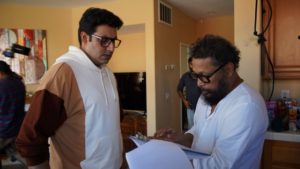 A. I feel people are always restrained in terms of expressing themselves. A communication gap prevails when we interact with one another. Amid hustling in our lives, we often forget how to nurture relationships, maintain honesty and be clear about intentions in our conversations. I have found all these in this film between the father-daughter dynamics and also with the life journey that Abhishek goes through. Such elements inspired me to make a film to talk about life and death. So this was basically the thought I played with. [In his book titled Unquit Forever – Keep Yourself in the Game, Arjun Sen, who is Shoojit’s friend, narrated his journey of not giving up battling cancer defying doctors’ prediction that he won’t survive long.]
A. I feel people are always restrained in terms of expressing themselves. A communication gap prevails when we interact with one another. Amid hustling in our lives, we often forget how to nurture relationships, maintain honesty and be clear about intentions in our conversations. I have found all these in this film between the father-daughter dynamics and also with the life journey that Abhishek goes through. Such elements inspired me to make a film to talk about life and death. So this was basically the thought I played with. [In his book titled Unquit Forever – Keep Yourself in the Game, Arjun Sen, who is Shoojit’s friend, narrated his journey of not giving up battling cancer defying doctors’ prediction that he won’t survive long.] Q. You also witnessed your close friend, late actor Irrfan Khan, who died of cancer. Did that influence you remotely in the making of this film?
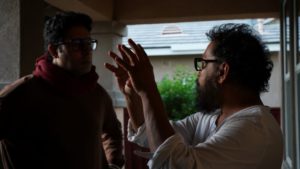 A. Yes, somewhere of course, because he (Irrfan Khan) was dealing with cancer for two years and I started working on the script just after that. The fact that he could not deal with the disease definitely made an impact on me. So I had to make a film where someone could deal with it. Arjun Sen, my friend, is someone who has dealt with the disease beautifully and he is still alive. That’s the journey. I wanted to come up with that hope.
A. Yes, somewhere of course, because he (Irrfan Khan) was dealing with cancer for two years and I started working on the script just after that. The fact that he could not deal with the disease definitely made an impact on me. So I had to make a film where someone could deal with it. Arjun Sen, my friend, is someone who has dealt with the disease beautifully and he is still alive. That’s the journey. I wanted to come up with that hope.Q. How did you zero in on Abhishek Bachchan to play Arjun Sen? Has Abhishek being middle-aged with a daughter helped him bag the role?
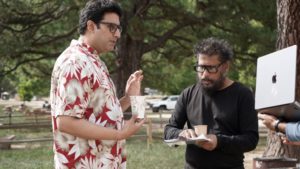 A. Yes, that’s also a factor because the character demands someone within that age bracket with a similar journey and one who would open himself up completely, bare himself physically and be naked in front of the camera without worrying about his body. I tried to exploit such qualities which Abhishek possessed. I guess he has also exploited me as a director (laughs).
A. Yes, that’s also a factor because the character demands someone within that age bracket with a similar journey and one who would open himself up completely, bare himself physically and be naked in front of the camera without worrying about his body. I tried to exploit such qualities which Abhishek possessed. I guess he has also exploited me as a director (laughs).Q. You have worked with acting legend Amitabh Bachchan (who is also Abhishek Bachchan’s father) in Piku. Mr. Bachchan and Abhishek come from two completely different eras and school of thoughts. How do you adjust to their mode of operation as a filmmaker?
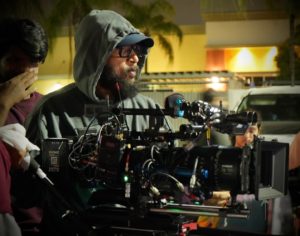 A. Mr. Bachchan is very particular in terms of his method, rehearsals and practice. Abhishek, on the other hand, is much more chilled out and relaxed. He takes time on the set hanging around. Their modes of preparation are completely different from one another. I never force the actors. Mr. Bachchan is extremely particular about the minute details that one has to tell him. Though Abhishek also needs to be informed about the details, he is much better at the job if he is left alone to be free-flowing.
A. Mr. Bachchan is very particular in terms of his method, rehearsals and practice. Abhishek, on the other hand, is much more chilled out and relaxed. He takes time on the set hanging around. Their modes of preparation are completely different from one another. I never force the actors. Mr. Bachchan is extremely particular about the minute details that one has to tell him. Though Abhishek also needs to be informed about the details, he is much better at the job if he is left alone to be free-flowing.Very importantly, I saw a beautiful Jaya Bhaduri (now Jaya Bachchan, veteran actress and Abhishek Bachchan’s mother) in Abhishek’s eyes. I saw the calmness of Jaya Bhaduri from Dhanyee Meye or Koshish or Guddi in his eyes, which are naughty yet loveable.
Q. In one of your recent interviews, you talked about casting Varun Dhawan abruptly in October. What’s your usual process of casting? Is it very instinctive?
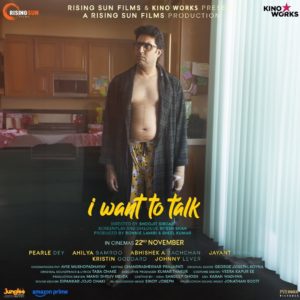 A. It might be abrupt in terms of casting but not in terms of thinking of the mannerisms that an actor needs to have to play the character. To me, an actor is a character. I need a character’s mannerisms and what he/she brings in with his/her own understanding of life. So it’s not abrupt. I look for the right person who is physically as well as internally ready to surrender. I notice how much innocence is reflected in the person’s eyes.
A. It might be abrupt in terms of casting but not in terms of thinking of the mannerisms that an actor needs to have to play the character. To me, an actor is a character. I need a character’s mannerisms and what he/she brings in with his/her own understanding of life. So it’s not abrupt. I look for the right person who is physically as well as internally ready to surrender. I notice how much innocence is reflected in the person’s eyes.Q. Your films deal with subjects which are often emotionally excruciating. How do you liberate yourself from it, noting the fact that a director lives with a film the longest than anyone else?
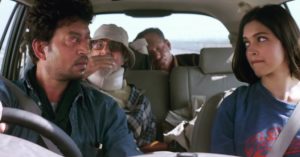 A. Yes, it is sometimes excruciating. But I see a lot of smiles, laughter, humour in life and death and in adversities. One has no control over adversities. So I have slowly learnt to laugh at them, get it over and move on and that’s what the audience sees in my films too.
A. Yes, it is sometimes excruciating. But I see a lot of smiles, laughter, humour in life and death and in adversities. One has no control over adversities. So I have slowly learnt to laugh at them, get it over and move on and that’s what the audience sees in my films too.Q. You have taken a small break since your last directorial film. Is it a conscious decision or it just happened?
A. No, the break was basically because my script was not getting ready. Now I am working on the script of my next film, so I hope to come back soon and make another film immediately.
Q. Your filmmaking style is appropriate for the language of OTT. How do you see this space?
A. OTT has given me a huge number of film lovers and audiences. Due to OTT, my films have gotten a wide release. So it has also given me a private viewing and also a longer shelf life. Contrary to earlier days, films are now available even after its complete run in theatres. It’s a good thing for filmmakers.



